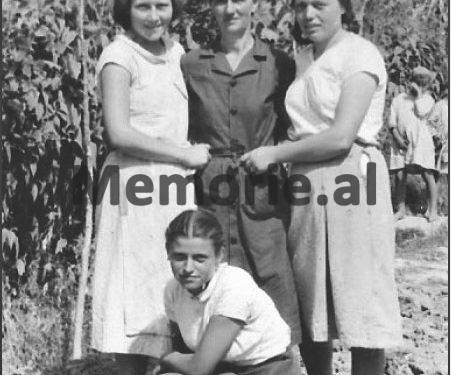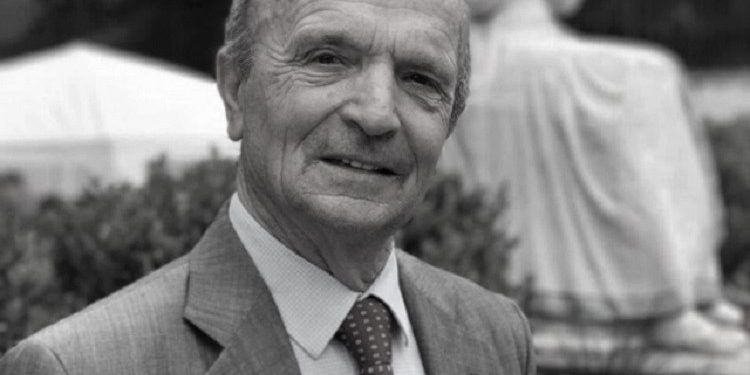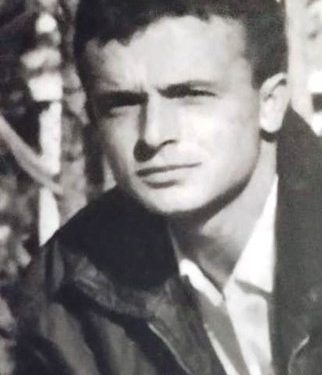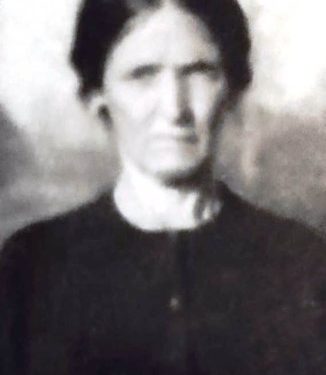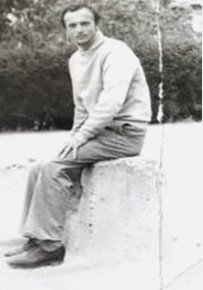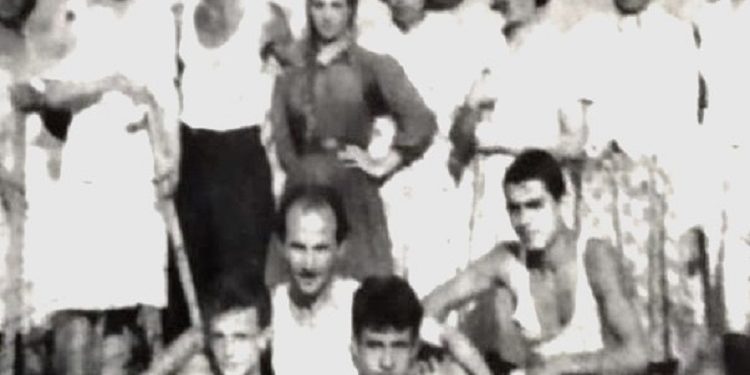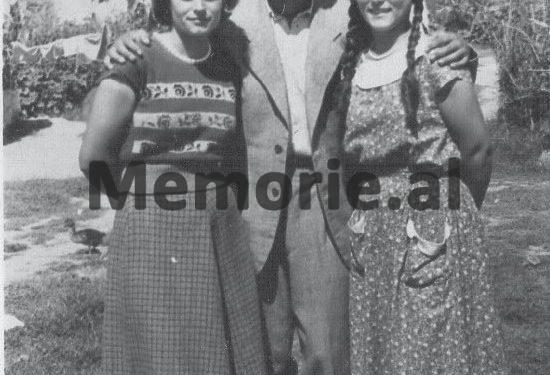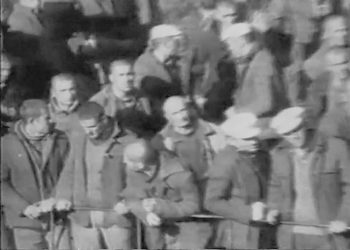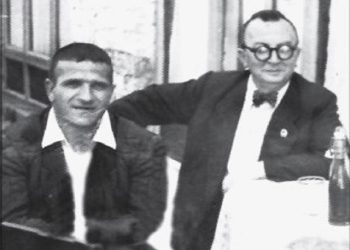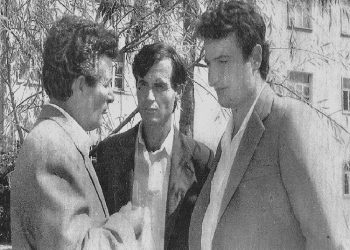By SIMON MIRAKAJ
Part eight
“Camps under the shadow of Tomorri, 44 years of internment”
– Memories –
Memorie.al / I put these memories down on paper after a long period of hesitation. This is probably because the subjects were always fresh in my mind, which followed me mercilessly during the years after the fall of communism. But there comes a moment – when time takes its course – and the images of horror and suffering came fading to me – almost the suffering passed into oblivion. Then I decided to repeat the most impressive events – first in my mind – until they took the form of these narratives. As dim as these accounts may seem – they create the idea of the harsh reality and misery of the camps.
Continues from last issue
Dom Mikel Koliqi – Gjaze 1976
We had heard that they would bring Dom Mikel Koliq to the Gjaza camp where we were. The clergy in general and the Catholic clergy in particular, had paid dearly for their faith in God. A large part of the Catholic Clergy was executed, such as Father Anton Arapi, Dom Lazër Shantoja, etc. The part that escaped execution spent years in camps and prisons.
After finishing the prison, they were brought to the internment camps. I remember in the Tepelena camp, Father Jak Gardinin, Father Viktor Volaj. In the Savra camp, Father Mark Arapin, Dom Nikollë Mazrekun, Dom Ndoc Sahatčinë, Father Marjan Prelën, Dom Lazër Jubanin, Dom Mikel Koliqin. All educated in the West, and with a similar culture. They radiated only kindness when we looked at them in the appeal we made in the morning and at dinner.
Most of the time we showed up three times a day. If a delegation came to Tirana, we would appeal three times, as well as for any kind of celebration. At the dinner call, the manager tells us: “Today we have been added, Mikeli has come.”
We see from the door of the barracks, where Dom Mikeli comes out in that black suit, characteristic of the friars. Take the direction to us, to the appeal. He greeted us all with a smile. After the manager left, they started talking to Dom Mikel, telling him: don’t be upset.
“No, I found you here, no, I’m not upset, I’ve learned.”
They had brought him from the plow internment camp. He was said to have baptized a child. We had a meeting with Dom Mikel on purpose. It was very neat. When I came home from work, I would see him on the dusty road walking with his hands behind his back, always alone. I was convinced that the prayers of the religious right, he did on the way. On summer days, when he washed his clothes outside, after squeezing them and hanging them on the wire, they shone. He cooked like a good chef, made pies, cakes, etc. They kept him well, he didn’t work, he was old, and he was over seventy.
Dom Mikeli was passionate about classical music. The young people of the camp who had an ear for music, Dom Mikeli taught you accordion, mandolin, etc. He never came home to visit anyone. It was Easter and we celebrated it very carefully, so as not to be understood. When we joined the appeal, after the responsibility left, Dom Mikeli wished us Easter and I addressed him: “Why didn’t you come to visit Dom Mikeli once”?!
Dom Mikeli put his lips to the gas and says to me:
“Don’t remember that I left him out of fear. I don’t come because of you.”
In the sector, they had placed a loudspeaker on a pole, which annoyed us more with those songs without any musical value, but there were times when it played classical pieces. I was returning from work, when Dom Mikeli was stopped near the pillar, and I approached him. I saw that he was enjoying the classical part; after it was over we said goodbye and he said to me:
“Simon, this part was ‘Rustic Cavalry’ by Pjetro Maskanji”.
He began to tell me about Maskanji:
“I myself participated in his burial.”
“Dom Mikeli, what opera was it”?
“It is the death of Don Quixote, sung by a famous Russian tenor, Fyodor Shalyapin”.
In the 70s, there was a sign of softening which did not last long. In this period, the red corners and meeting rooms were equipped with black and white televisions, such as; “Iliria”, “Lura”, “Adriatik”, which were produced in Durrës.
We followed the sport when it was broadcast by Albanian Radio-Television. On that day, a European Championship match would be played. We had worked hurriedly to make the norm, and then go to the hall to watch the match. From the last minutes, two young guys from the State Security enter the hall, with automatic weapons at their sides. We froze; the arrests had started since 1973, without interruption.
Every two to three months, an internee was arrested. We waited until the first half was over and went home waiting. I, begging God to arrest me, if they intend to, not brother Sokol, because he was married and had children. Sokol says to Vilma, who was about eight years old:
“Go see, has ‘Jeep’ arrived – how, what number is it?”
She ran out, it didn’t take long and she came crying:
“They tied up Dom Mikel”.
He had just turned 76. What horror…?! We took a breather.
“We saved this turn”! – I told my brother.
“No,” he told me, “you’re wrong, a terrible end is better than an endless horror.” And really, every day we greeted our brother, sister-in-law, kissed the children, because we didn’t know if we were going home or not! Dom Mikeli, after two months the investigator, appeared in court. He was convicted of the charge, as; “Vatican spy”, with 15 years in political prison.
The day he was arrested, we said we would never see him again, as we suspected he would not leave the prison alive. But God is great. He served the prison years and was released. After I was released from the camp, with a group of friends, I went to Shkodër to meet him. I found him sitting in an armchair, reading.
“Dom, do you know me”?
“No,” he told me, “I’m sorry.” – It had been 90 years. Then excitedly I say:
“Dom, I’m Simon” – I took his hand and kissed it. The first question he asked me:
“Are you married”?
“I just got engaged to a Catholic girl from Puke, exactly from Iballje”
He shook my hand. I congratulated him on the high title of Cardinal.
“This title was not given to me, but to everyone, our works and sacrifices”.
It was really lucky that we had these great-spirited people. Rest in peace Dom Mikel.
There is no permission to see the mother. Halfway through 1973
After I made the morning appeal like every day, I directed you to the brigadier, to get the work plan, as soon as the brigadier saw me, he said:
“You, Simon, Gjoni and Xheviti, will throw nitrate fertilizer on the plots near the church”.
The church had been turned into a stable, but, as it was known as the area of the church, from the sector, it was 2 km. half way. We went to the warehouse where the fertilizer was kept we started loading the carts that were waiting for us. From 9.00, the carts arrived at the destination, we started filling the meringue bags with nitrate, to start the work, the weight we carried on our shoulders with fertilizer was 20 kg., and the plot where we were going to throw the fertilizer was 10 ha.
We all put our sack on our shoulders and started, it was not easy to throw manure, it was quite heavy work, you had to hold the mouth of the sack open with one hand and, with the other hand, distribute the manure in such a way such that not even a root of wheat was left without receiving the necessary food. What made my work even more difficult that day was my mother hospitalized, as she was suffering from heart disease, a disease that took her life at a young age, 54 years old?
She was hospitalized for two months, we didn’t have the opportunity to see her, neither me nor brother Sokol, and they didn’t give us permission. His sister-in-law Vali had gone to see him in the hospital, his sister Lajdja had also gone, but the desolate mother sat at the window, waiting for the boys to call her, but in vain! We continued to work without a break. Our arms were sore from the weight, around 15:00, we finished, we sat down to eat bread, after we finished eating, and we rested for a while, and left for the sector in Gjaza.
On the way, Sokol and Sazan (son of Fiqiri Dines) also joined us, they were in another brigade. As soon as we arrived in the sector, we see on the left side of the road, the “Jeep” of the Department of Internal Affairs 67/01. “Let’s see whose turn it is”, we said to ourselves. Arrests were made every two to three months, not only in the internment camps, but throughout Albania, the news about the arrests was revealed immediately.
Eight years in a row, we didn’t know if we were coming home when we left for work in the morning. Better a terrible end than endless horror. When one of our friends was arrested, we used to say; he saved, gathered his mind, as the uncertainty of life was at every moment.
At 6 o’clock in the evening, we went to the appeal, which was made for us by the chief spy Nikolla Jani, from Bubullima e Lushnje.
When he was absent, he and his wife Rita called us, they were negative people. Nikola was also the storekeeper of the sector, most of the time; you could find Nikola on the street, controlling our every move, of course together with other agents recruited by the State Security.
The operatives, or otherwise the Security officers, who secured the dictatorship state, putting innocent people in prison time and time again, with different tricks, or creating groups of saboteurs, who, with strange accusations, led them to capital punishments.
We went to the place where we were making the appeal, when we see the deputy head of Lushnja’s Internal Affairs Branch, Mehdi Bushati, leaving the office with the operative. They didn’t come to the appeal where we were, but they were staring at us from afar and the operator made our presentation. After the appeal, my brother says:
“I’m going to tell the vice president for permission to go without my mother”! “Go – I tell him, – if God gives you permission, it would be the best medicine for him, since we have two months without seeing him”.
Sokoli leaves, while I stayed further away, waiting for him. When they saw Sokol coming towards them, they stopped their steps. Sokol introduces himself and says:
“Good evening, I have come, vice president, to ask you for a leave of a few hours to go to the hospital, our mother, Kune Mirakaj, has been hospitalized for two months, we have asked for leave, but it has not been granted, so if you look at her reasonable, make it possible for us to leave for a few hours, the mother suffers from heart disease, the heart is not known, the disease is said to have advanced. The vice-president listened to him and, with the coolness of a snake, turned to Sokol:
“There is no permission, I haven’t seen my mother for two months either”, Sokol was “risposta payata”:
“You vice president, you don’t go to your mother, because you don’t want to, not because anyone is stopping you”! And headed towards me, where I was waiting for him:.
“He didn’t give me permission.” Annoyed by his answer, we went home, the annoyance lasted a little, because we knew well, in whose hands we were, unfortunately, the only thing that protected us from the wolves, was faith in God.
After democracy, like many others of this category, they took important positions in many ministries, such as the Ministry of Foreign Affairs and Interior, etc. In 1990, Mehdi Bushati became the director of the “Qemal Stafa” Stadium, of course he wants this and a good pension as a soldier and with decorations: “for contribution”, in both times! Memorie.al
The next issue follows




